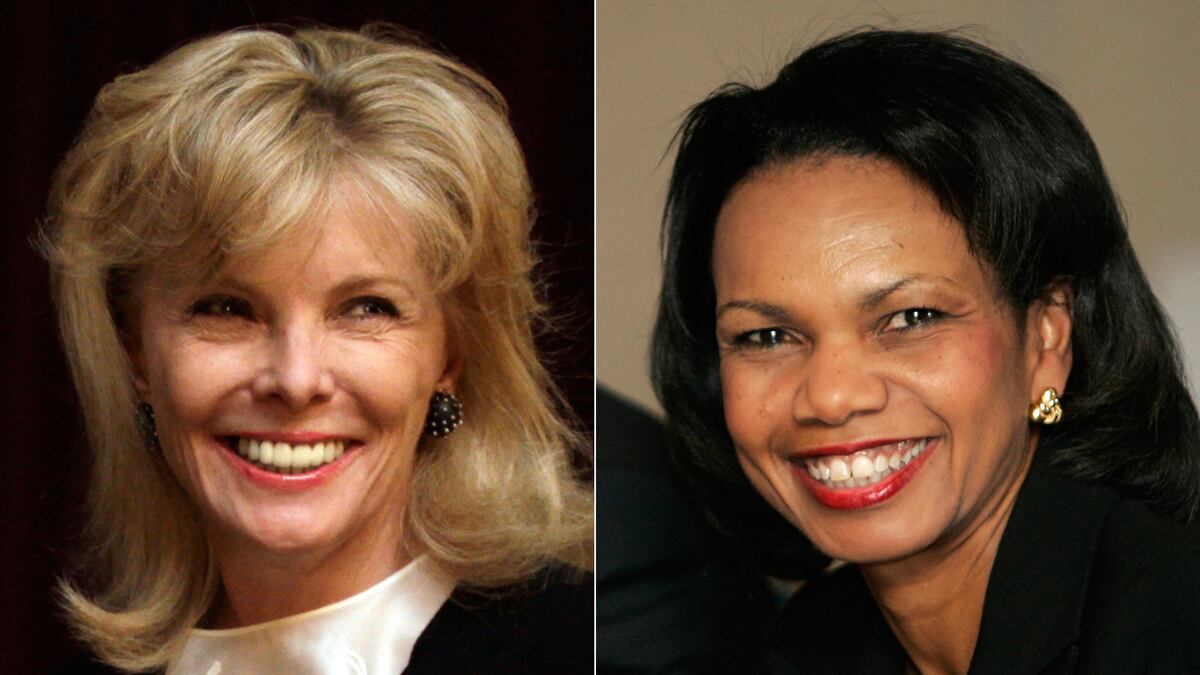Well, smack my face and call me Sally. The boys at Augusta National have finally taken the “No Girls Allowed” sign off the clubhouse door.
On Monday, the exclusive golf club announced that come October, it will bestow its snazzy green membership jacket on not one but two avid golfers of the female persuasion: business exec Darla Moore and former Secretary of State Condoleezza Rice.
Aware of the symbolic import of the move, club chairman Billy Payne chucked the club policy of not discussing membership matters to cheer these newest additions to the family. “It is,” he proclaimed, “a joyous occasion.”
You could almost feel the waves of relief rolling off Payne as he effectively ended one of the weirdest skirmishes in America’s culture war.
For most of Augusta’s eight decades, nobody paid much attention to the club’s lack of female members. Why would they? Plenty of golf clubs remain all male (Burning Tree in Bethesda, M.D.; Preston Trail in Dallas) or, more ticklish still, all-white (Belle Meade in Nashville; Forest Lake in Columbia, S.C.).
Indeed, it’s tough to think of a pastime with a more elitist, exclusionary rep than golf. (Polo? Fox hunting? Dressage?) And even within the hidebound world of golf, Augusta is known for its obsession with upholding the history and traditions of the game—whatever the hell that means. Temperamentally speaking, Augusta is so small “c” conservative it makes George Will look louche by comparison.
As long-running host of the Masters, however, Augusta has major cachet in the golf world, which is precisely what led to the legendary Hootie Johnson-Martha Burk smackdown of 2002.

In a nutshell: that June, Burk, then head of the National Council of Women’s Organizations, sent a letter to Johnson, then Augusta’s chairman, contending that it was discriminatory for the Masters to be held in such a flagrantly estrogen-free zone. Johnson fired back that, as a private club, Augusta could exclude whoever it damn well pleased and would under no circumstances change its membership policies “at the point of a bayonet.”
There the squabble might have ended if not for The New York Times and its then-executive editor, Howell Raines. Barely a year into the job and itching to jazz up the Gray Lady, Raines latched onto the Augusta drama like a hound dog on a ham bone. By November, Times readers could not escape the story: front-pagers, sports columns, op-ed pieces, and an editorial suggesting that then king-of-the-green Tiger Woods skip that year’s Masters to “send a powerful message that discrimination isn't good for the golfing business.” Raines didn’t just “flood the zone” on Augusta, he nearly swamped the entire paper.
Raines’s fixation with the club swiftly became the talk (read: laughingstock) of media both old and new. Media critics and bloggers bashed him for ginning up controversy, manufacturing news, and flogging the issue as part of his liberal agenda. Some of the attacks got a wee bit personal, mocking the Alabama-reared Raines as a “guilty Southern white boy” looking to replay the civil rights struggle. Within the conservative blogosphere in particular, the story was no longer about the retrograde views of a few good ol’ boy golfers; it was Exhibit A in how an uppity media elite shoves its views down the throats of the rest of the country. It was an irresistible feast for ravenous culture warriors on both sides.
When the news broke early that December that the Times had killed two columns that disagreed with its Augusta editorial, the media world pounced on it as proof of Raines’s journalistic malpractice. The Times was forced to shift into full-blown damage-control mode, both internally and externally. Its reputation bruised, the paper belatedly ran versions of the columns in question.
Eventually, the hubbub subsided, and most everyone went back to ignoring Augusta. When Martha Burk held a protest in a grassy lot near the club during the 2003 Masters, fewer than three dozen people stood with her. Every few years around tournament time, someone would publicly opine about the awkwardness of the situation, and the folks at Augusta would primly refuse to discuss membership matters. Most notably, this spring there was grumbling when the club didn’t offer a membership to Virginia Rometty, the new CEO of IBM, as it had with the previous four heads of Big Blue, an enduring corporate sponsor of the Masters. A sprinkling of media stories appeared. A few politicians made statements. But the issue never really caught fire again.
Even so, at some point Augusta members clearly got tired of being asked the same old questions. And now, it seems, the issue is no more. Condi and Darla Moore will get to hang with the boys. Augusta can stop laboring to defend an increasingly indefensible position. Culture warriors can focus their energies on a controversy that more people give a crap about. Everybody wins.
Plus, just think how fantastic Condi’s green jacket will look with those ass-kicking knee boots she likes to rock.






